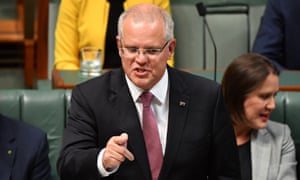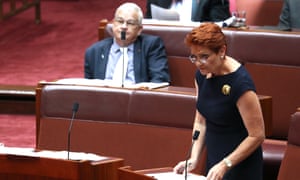Extract from The Guardian
As current and former One Nation members battle over sexual
harassment accusations, Coalition takes drastic action to stave off
Labor trap
It’s hard to find the words to capture the precise form of unhinging
that is playing out in the 45th parliament in its final days, but let me
try.
Over the past couple of days, a war between current and former members of One Nation resulted in allegations of sexual harassment against a staffer being aired under parliamentary privilege, a retaliatory allegation of unwanted back stroking, a physical confrontation between a staffer and a senator, blood smeared on Pauline Hanson’s door, and, finally, the revocation of a staffer’s parliamentary pass.
Again, just to drop you into these surreal end-of-days, it’s worth recording Brian Burston’s account of smearing blood on Pauline Hanson’s door. If you’ve forgotten who Burston is, and let’s be honest, forgetting him is entirely reasonable given he hasn’t troubled the scoreboard since his arrival in Canberra in 2016 – he was with the One Nation posse until the aforementioned internecine war prompted him to join up with Clive Palmer’s United Australia Party.
Now we’ve identified Burston, who, after all, enjoys his position in public life at your expense, let’s get back to his singular testimony. “Whilst I do not recall the incident of blood on the door I now have come to the conclusion that it was myself and I sincerely apologise for that action.”
It was myself that dunnit. I think. Compelling, obviously.Over the past couple of days, a war between current and former members of One Nation resulted in allegations of sexual harassment against a staffer being aired under parliamentary privilege, a retaliatory allegation of unwanted back stroking, a physical confrontation between a staffer and a senator, blood smeared on Pauline Hanson’s door, and, finally, the revocation of a staffer’s parliamentary pass.
Again, just to drop you into these surreal end-of-days, it’s worth recording Brian Burston’s account of smearing blood on Pauline Hanson’s door. If you’ve forgotten who Burston is, and let’s be honest, forgetting him is entirely reasonable given he hasn’t troubled the scoreboard since his arrival in Canberra in 2016 – he was with the One Nation posse until the aforementioned internecine war prompted him to join up with Clive Palmer’s United Australia Party.
Now we’ve identified Burston, who, after all, enjoys his position in public life at your expense, let’s get back to his singular testimony. “Whilst I do not recall the incident of blood on the door I now have come to the conclusion that it was myself and I sincerely apologise for that action.”
Actually let’s start slightly before Thursday, because the distance from home base to completely off the reservation is generally measured in a number of steps.
It’s obvious to anyone watching that Scott Morrison has been building up to full tropical thunder, never mind the fine print, on border protection, in order to better engage the voting public on the alleged weakness of Bill Shorten’s character. The prime minister has been warming to his theme.

Shorten has mostly resisted full frontal engagement as Morrison has indulged his growing passion for the subject. The Labor leader has been turning his back on the blowing gale, physically and figuratively.
But the opposition decided on Thursday to spring a little procedural mayhem just to keep everyone match fit.
A majority in the Senate on Thursday morning voted in favour of a royal commission into disability services. Government folks voted against this motion at 12.15pm.
Labor, with crossbench support, felt moved to bring the motion to the House for concurrence, a development which, on all available indications, would result in the government losing a second vote in a week, which would be untidy to say the least.
Sensing a trap about to be sprung, the government unleashed an epic filibuster, staging the longest question time in the history of federation at 150 minutes. Nobody read out their shopping lists, but for a moment or two, resorting to something that undignified seemed entirely possible.
Visiting the floor of the House, the Greens senator Jordon Steele-John, straight-backed, implacable, in his wheelchair, roared his disapproval at the time wasting. “Bring on the vote,” he demanded, from his vantage point near the door. Counselled to be quiet, Steele-John hollered: “I bloody well will not.”
Unmoved by this appeal, the government ploughed on with the questioning, and the answering, measuring out the minutes until the scheduled adjournment. Government people now claim they were unaware Labor was going to press the disability issue – the fear was some other unheralded procedural mayhem.
According to this version of events, the manager of government business, Christopher Pyne, kept checking whether the required message had been sent from the Senate. The message had not been sent, suggesting to the government that Labor was about to embark on another course – some other motion, some other bill.
It’s hard to comprehend this confusion, given Labor was clearly telegraphing its intentions in specific questions to the government, and Steele-John’s resolute presence in the chamber also seemed another substantial clue – but given the collective madness that had descended, let’s acknowledge that anything is possible.
The government now says, just for the record, it would have allowed the disability motion to pass had it reached the chamber, and will allow it to pass when it turns up in the House next week.
In any case, intent on its own plan, Labor attempted to bring matters to a head as the clock crept towards 4.15pm. At that point the House Speaker, Tony Smith, could bear no more of this slide into the Twilight Zone.
He announced to the House that the message to trigger the vote the government was supposed to lose had not arrived. He then gave Labor’s Tony Burke a clip for pushing the boundaries of House procedure.
Smith drew on the strongest case he had: his abiding belief that the institution of the parliament is an institution worth defending.
“The conventions in this place matter,” the Speaker said.
Lest this homily be subject to misinterpretation, Smith told his charges there was one thing that wasn’t going to happen on Thursday 14 February in the House of Representatives at just before 4pm. People were not going to “make up” standing orders: not on his watch.
In the other chamber, at around the same time, the Senate president, Scott Ryan, was also drawing on the ballast of the institution to call an end to mayhem of a different type.
Ruling on the disorder of Pauline Hanson’s adviser, James Ashby, scuffling with Burston in full public view, like a couple of bullies behind the bike shed, Ryan declared enough was enough.
“Senators must be free to go about their work in this building,” he said. Ryan noted that access to the building was conditional on certain standards of civility and decorum being maintained, and those standards had been breached.
“Accordingly I have exercised my authority to revoke Mr James Ashby’s pass to access the building and prohibit him from entering the building for the time being.”
In a week where everything was heightened, yet not much made sense, Smith and Ryan stood, like small beacons, in the diminishing, and the chaos.

No comments:
Post a Comment